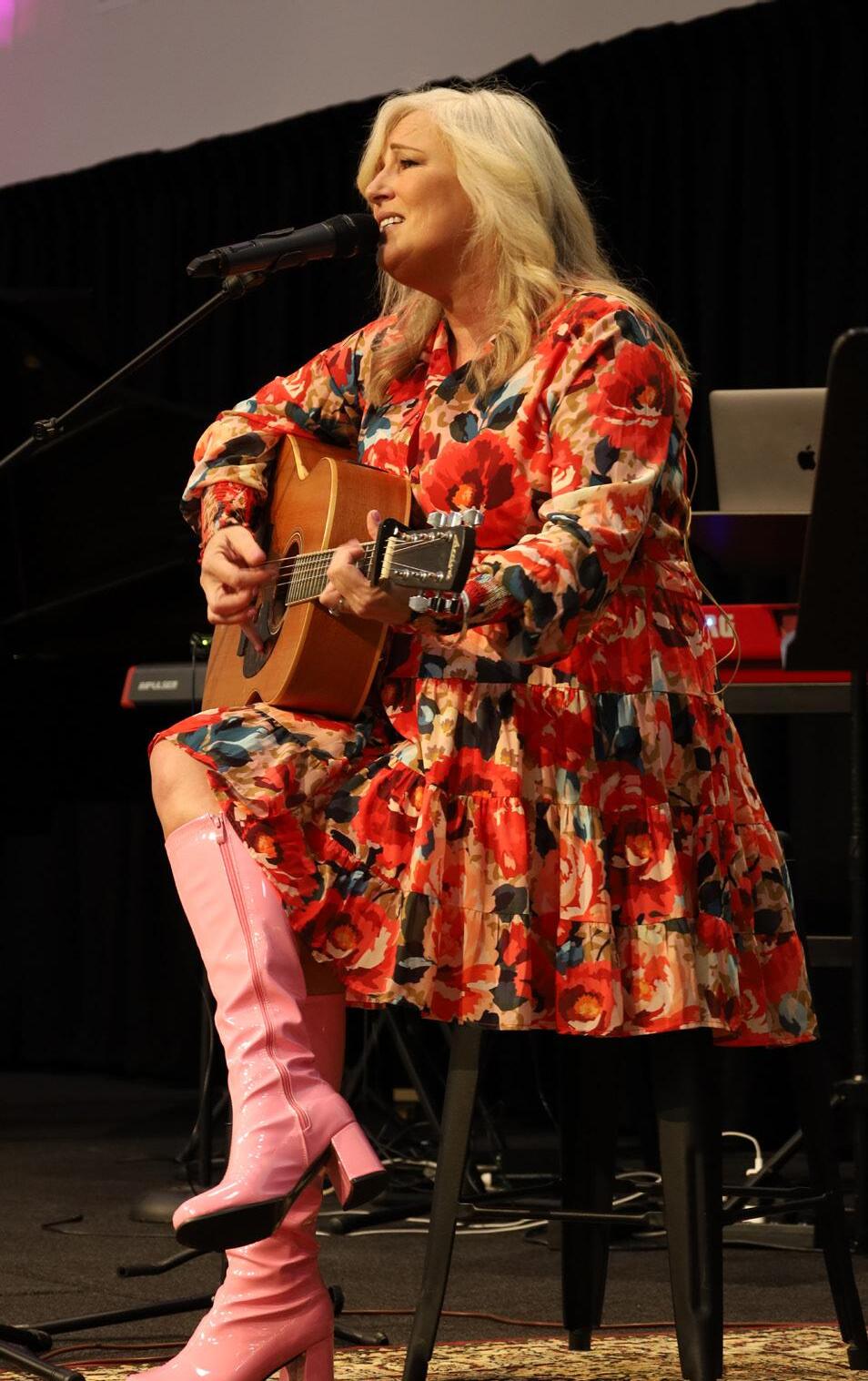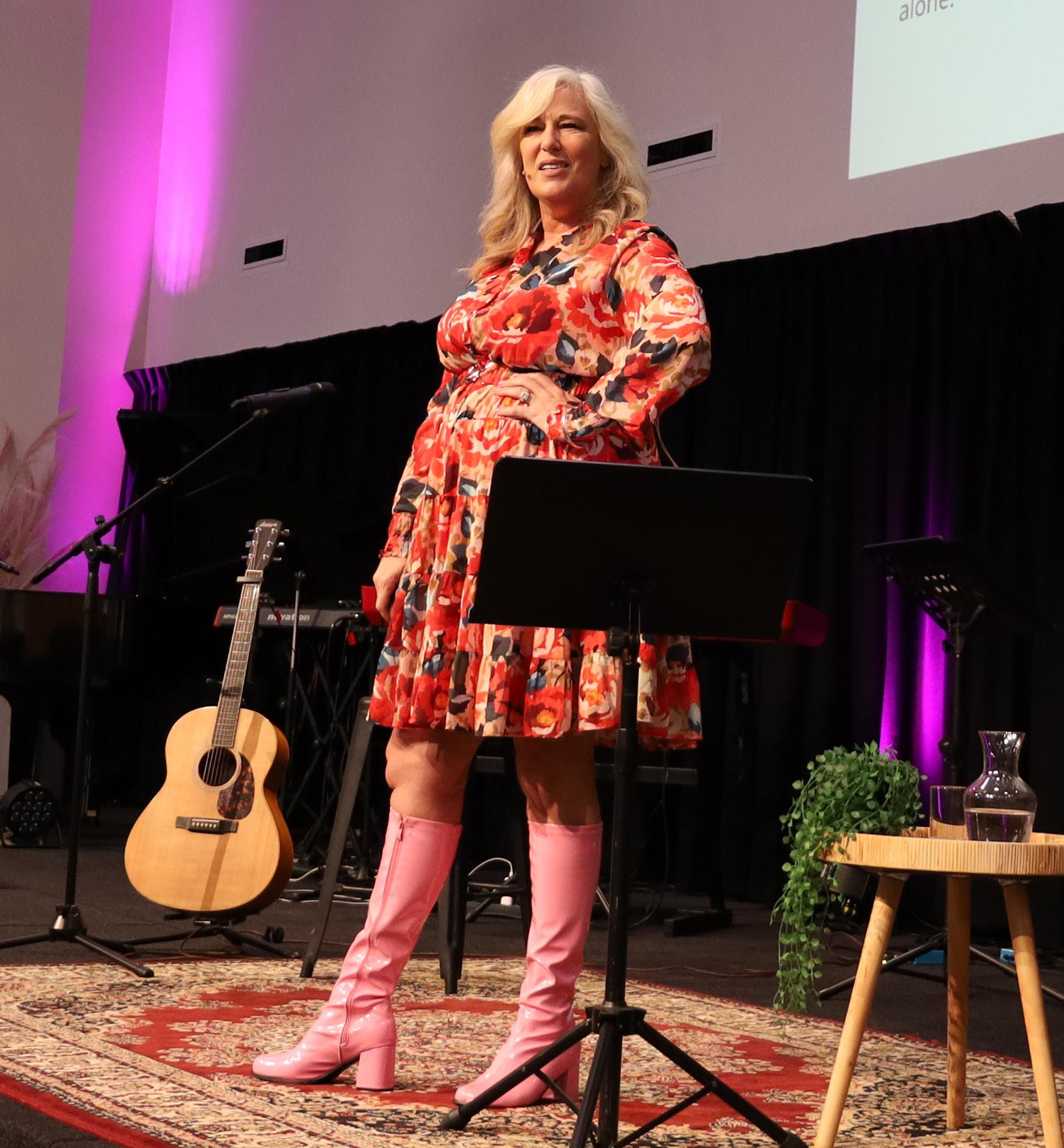
5 minute read
Be Kind to Your Mind
Christian artist, musician, author and mental health expert Julia Grace offered practical wellbeing tips for ‘being kind to your mind’ to the hundreds who gathered at Johnsonville Salvation Army over the weekend of July 22 to 23. Jules Badger reports, with photos by Captains Robert and Susan Adams.
Julia Grace is well-known to many in The Salvation Army, particularly people at the Johnsonville Corps who once again had the pleasure of hosting Julia as a guest speaker. A special women’s event was held on Saturday evening, with Julia also speaking to a full house on Sunday morning, followed by a lunch for youth and young adults after church to conclude the weekend.
With a passion for connecting people, hospitality coordinator Karen White and corps officer Captain Susan Adams knew Julia’s practical and positive message would be helpful to many, so they quickly got to work organising the event.
‘We knew we needed to be talking about mental health more as a faith community, but we also knew that this was something we could invite family, friends, workmates and neighbours along to,’ explains Karen. ‘It’s a topic that touches everyone. Even if we are not currently going through something mental health-related ourselves, there will be someone around us who is.’
A fun night out
When it came to the women’s event, Karen reports that feedback has been overwhelmingly positive. ‘The messages I received afterwards were so encouraging. Women came who’d never been inside a church before. The food was delicious, and the decorations were beautiful. We really wanted to honour the women who came and show them we care by putting on a fun night out.’ And Julia did not disappoint on the fun front! With her signature blend of humour and music, Julia was able to share lessons from her lived experience of mental illness and recovery, with compassion and candor. On the Sunday morning she promised the congregation a practical message and delivered powerful content through meaningful and memorable acronyms and anecdotes for ‘being kind to your mind’.
Jelly and rum
Julia encouraged those gathered to identify a ‘jelly buddy’—someone you can rely on when you are having what she called ‘a wobbly day’ mentally. Julia made it clear that she wasn’t suggesting a jelly buddy be your counsellor or psychologist, but simply someone you give permission to push a bit when you say you’re fine, but clearly, you’re not. ‘On our good days, we prepare for the wobbly days,’ she affirmed.
It’s a brave woman who talks about rum at The Salvation Army, but Julia did so with appropriate and instructional flair! Using the acronym ‘RUM’, Julia outlined that mental health issues are Reasonable, Universal and Manageable.
‘Mental health issues are Reasonable because they make sense,’ she explained. ‘They are a reasonable response of the body to the pressures of life. We shouldn’t be surprised when our brain tells us it has too much information! I’m over stimulated! And now I am going to give you some signals that you need to listen to! So rather than fighting our brain or trying to cast out our brain, I encourage you to ask yourself what your body is trying to tell you. God has created us so that our body gives us signals when something is not right, but we are really good at ignoring them.’
Mental health issues are also Universal—we are all on a wellness spectrum. ‘I want to encourage you that if you suffer with anxiety or depression or burnout or anything on the mental wellbeing spectrum, you can still lead an amazing, productive life,’ she said.
Using her own testimony as proof, Julia added that mental health issues are also Manageable because there are so many tools available. ‘Some days I have to get every tool out of the toolbox to help me,’ she said. ‘But that’s okay and just part of my overall health journey.’
A cup of tea and a lie down
Giving voice to one of the recurring questions of our times: Why are we so tired? Julia offered a plethora of helpful science. ‘Our brain is an energy-hungry monster,’ she explained. ‘Our brain is 2 percent of our body weight but uses 20 percent of our energy. When we are engaged in heavy cognitive thought that rises to 40 percent.’ Acknowledging that we live in an era of information overload, Julia offered some practical means for mitigating that pervasive exhaustion.
Looking to the Bible for inspiration, she drew attention to Jesus’ repeated call for rest. With reference to Mark 6:30–32, Julia suggested after a busy ministry trip with his disciples, Jesus was essentially advocating for ‘a cup of tea and a lie down’. Then drawing on John 4:5–6, Julia explained that good things happen when we take a break. Jesus’ interaction with the Samaritan woman took place because he stopped and sat down by the well.
Julia’s closing remarks were profound: ‘What are we missing in our busyness? What might happen if we put our phones down? If Jesus was advocating a cup of tea and a lie down and stopped to take breaks, perhaps we should follow his example.’
Watch the full message at tinyurl.com/KindMindTSA












